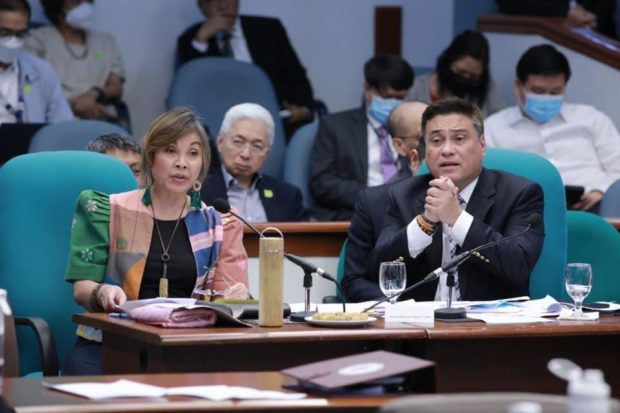
Senate President Pro Tempore Loren Legarda and Senate President Juan Miguel Zubiri at the session hall of the Senate. FILE PHOTO
MANILA, Philippines — As the Senate concurred in the ratification of the Regional Comprehensive Economic Partnership (RCEP) on Tuesday, Senate President Pro Tempore Loren Legarda emphasized that the international pact could help advance the country’s agricultural sector, and the nation’s economy adapt to the fast-changing global trade.
Legarda said that an innovative approach that sen. Pres. Zubiri and she did was to create an oversight committee to strictly monitor the government agencies’ support programs for msme, and the agriculture sector. The resolution the Senate approved contained the concerns of the various stakeholders and rcep oppositors.
During the interpellation period for Resolution 485 under Committee Report No. 29, Legarda pointed out that negotiations and consultations for the RCEP have been ongoing for ten years under three administrations.
However, she believes the initiatives of past Department of Agriculture (DA) administrations needed more to boost the agricultural sector; thus, entering into RCEP would benefit the country as it could help promote economic growth and development.
“I’m taking that big leap of faith, so to speak, so that we can go along with the other ASEAN nations, our neighbor Indonesia, as well as, Myanmar and Laos. Huwag naman tayong maungusan pa ng ibang bansa kung hindi tayo makasama sa RCEP na ito,” Legarda stated.
“We have to move forward, and we have to move forward along with our neighboring ASEAN nations lest we’ll be left by the wayside,” she furthered.
Legarda assured that the recommendations submitted by the oppositors are part of the resolutory clauses of the Resolution and emphasized that there will be government support programs in favor of farmers and fisherfolks, as well as representation of indigenous peoples, women, and other marginalized sectors.
Legarda noted that only 15 agricultural commodity groups corresponding to 33 tariff lines would have lower tariff rates than some ASEAN+1 FTAs under RCEP. The National Economic and Development Authority (NEDA) said this is equivalent to only 1.9 percent of the 1,718 agricultural lines and 0.8 percent of the total agricultural imports.
Of these 33 tariff lines, 17 are raw materials, 8 are intermediate products, and only 8 are final goods. The remaining agricultural tariff lines will have equal, or higher rates than other ASEAN+1 FTAs, or are excluded from import tariff concessions under the RCEP.
“All the ASEAN nations have ratified RCEP, and it is to our disadvantage if we do not join RCEP because RCEP countries who are our trading partners outside of ASEAN will put down their tariffs for other ASEAN nations, who will be exporting the same produced to those countries like China, Japan, South Korea, Australia, and New Zealand, while products from the Philippines will enter those countries with high tariffs,” Legarda explained.
She also underscored the significant roles of implementing agencies and the executive department in the improvement of the country’s agriculture sector.
“We cannot say that there is no more hope. For me, hope springs eternal. That is why we solicited the inputs of our farmers and fisherfolk. If the Department of Agriculture does not do their job in terms of eliminating smuggling and in terms of giving help to farmers who cannot access the Rice Competitiveness Enhancement Fund, life will not be better for our farmers and fisherfolk,” she said.
“Kailangan natin ang whole-of-government approach para paigtingin ang kalakal, ang agrikultura, ang pagbibigay ng pagkain sa mga taong nagbibigay ng pagkain sa ating hapag kainan,” Legarda added.
NEDA Secretary Arsenio Balisacan recently stated that non-participation or delayed RCEP ratification may result in foregone opportunities.
“We aim to promote greater openness, create a business-friendly environment, and provide a more stable and predictable system of trade,” he said.
RELATED STORY:
Legarda urges firm implementation of RCEP guidelines

